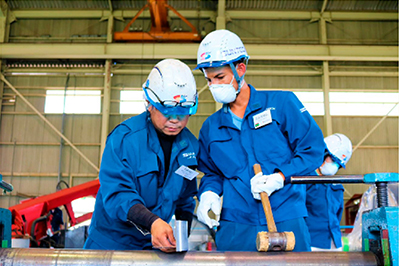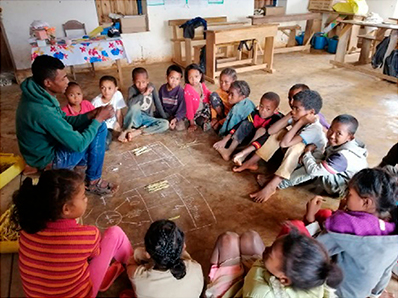ODA Topics 5
Japan as “a Partner Growing Together with Africa” —TICAD 8—

An ABE Initiative Note 4 participant in an internship at a Japanese company that manufactures metal products (Photo: JICA/Suntech Co., Ltd.)

Support for the development of education with community participation and school management models to improve access to basic education, quality of education, and gender equality (Madagascar) (Photo: JICA)
The Tokyo International Conference on African Development (TICAD) is an international conference on the theme of African development. Since 1993, TICAD has been organized under the leadership of the Government of Japan in cooperation with the UN, the United Nations Development Programme (UNDP), the World Bank, and the African Union Commission (AUC). The Eighth Tokyo International Conference on African Development (TICAD 8) was held in Tunisia from August 27 to 28, 2022, with the participation of representatives from 48 African countries, including 20 heads of state and government.
At TICAD 8, Prime Minister Kishida emphasized the importance of “investment in people” and “the quality of growth,” recognizing the potential of Africa as a driving force of global growth. He announced that Japan would invest 30 billion US dollars as the sum of public and private financial contribution over the next three years and carry out initiatives in the fields of (i) Green investment, (ii) Promotion of investment, (iii) Development finance, (iv) Public health, (v) Human resource development, (vi) Regional stabilization, and (vii) Food security. In addition to the three plenary sessions on “Economy,” “Society,” and “Peace and Stability,” a Business Forum was held. The Forum was attended by approximately 100 participants each from Japanese and African companies, and the strengthening of business ties between Japan and Africa was discussed. On the final day of the Conference, the TICAD 8 Tunis Declaration was adopted as a guidepost for future Japan-Africa relations and sustainable growth in post-COVID-19 Africa.
In order to support the sustainable growth of Africa, over the next three years, Japan will provide a variety of assistance in line with the needs of African countries, centered on initiatives in the seven above-mentioned fields. For example, with regard to (iii) “Development finance,” Prime Minister Kishida announced that Japan would provide co-financing of up to 5 billion US dollars under the Enhanced Private Sector Assistance (EPSA 5), Note 1 a collaborative framework with the African Development Bank (AfDB), including establishing a special window of up to 1 billion US dollars to support countries that have made steady and significant progress in restoring their sound debt management. In addition, toward realizing fair and transparent development finance, Japan cooperates with African governments and international organizations to support public-debt management capacity building.
With regard to (vii) “Food security,” Japan has provided a total of 130 million US dollars in food assistance to Africa in response to the food crisis caused by the impacts of the situation in Ukraine. Japan also announced that it would provide co-financing to the AfDB’s African Emergency Food Production Facility for approximately 300 million US dollars to strengthen mid- to long-term food production capacity. In addition, as initiatives to expand long-term food production, Japan has strengthened Africa’s own grain production capacity through the “Coalition for African Rice Development (CARD)” Note 2 with the goal of doubling rice production, and also helped increase the incomes of smallholder farmers in Africa by spreading the production of horticultural crops through the “Smallholder Horticulture Empowerment Project (SHEP)” Note 3approach. At TICAD 8, Japan announced its intention to assist with capacity building for a total of 200,000 people in the agriculture sector through these efforts. As “a partner growing together with Africa,” Japan will continue to strongly support the realization of a resilient and sustainable Africa that Africa itself aims to achieve.
Note 1: See the glossary.
Note 2: See “Stories from the Field 4.”
Note 3: See the glossary.
Note 4: See the glossary.
